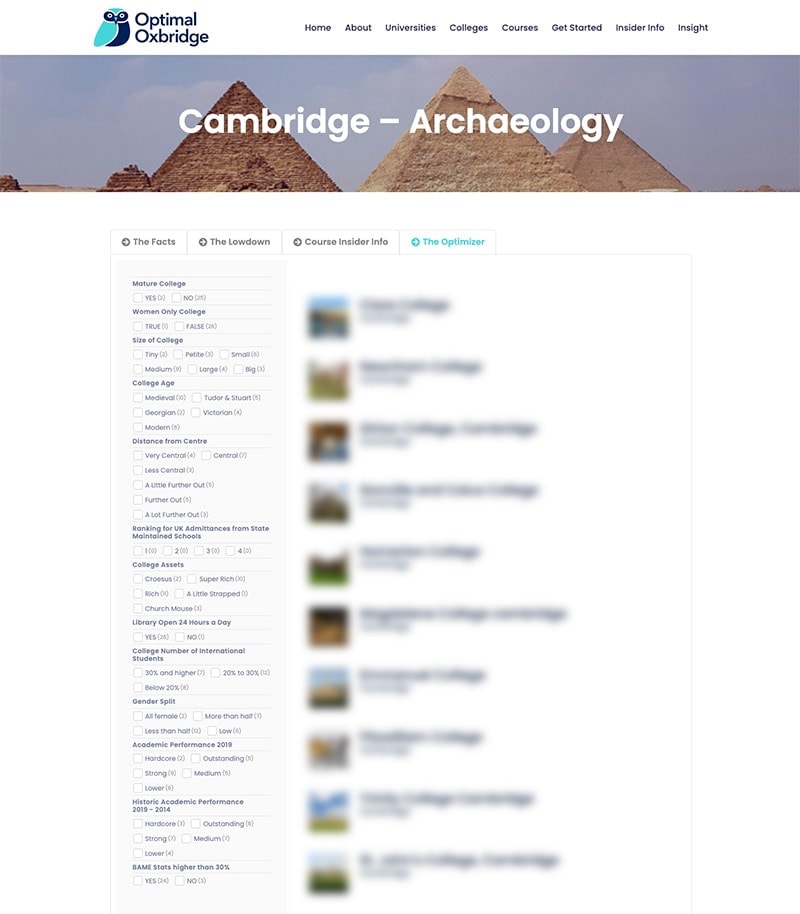Subscribe for full access to insider info and the optimizer.
Unlock access to the Optimizer and Insider Info
Let our optimizer help you find your college match faster. We’ll screen out the bad fits so that you can review the schools you’ll like best. Who knows? You might find a college you never knew existed.
The Facts
UCAS Code:
Q300
Standard Requirements:
A levels | AAA
IB | 38, 666 in HL
For other qualifications, check the Oxford University website.
Required Subjects:
English Language and Literature or English Literature
Advisable Subjects:
None stated by the university.
History or a modern language
One analytical piece of writing, or an excerpt from coursework, on English Literature which is no more than 2,000 words. Submitted pieces should be a short timed essay or a critical commentary, not a piece of creative writing. Excerpts from a longer piece of work (over 2000 words) are acceptable, and a note explaining the context of the excerpt may be provided as well. For pre-qualification candidates, a recently graded piece of work from school or college is sufficient. Tutors are, however, very aware of the impact that the pandemic has had on education, and thus if this is not possible, please specify the circumstances that your piece of work was produced in in the form that you submit with your written work. For post-qualification candidates, one can send in a piece of work composed whilst in education, or you can produce a new piece of work. This need not be graded, but it is important to specify the circumstances it was produced in. The deadline for this is the 10th November 2022.
235 (63% interviewed, 24% successful)

The Lowdown
Home to the biggest English faculty in Britain (and one of the largest undergraduate degrees in Oxford with around 235 undergraduates a year, of whom over 70% are female), the English Language and Literature experience at Oxford is unique. What sets the Oxford course apart from courses at other universities is its enormous scope of study.
First year students take papers from the beginning and the end of the periods covered by the course: Medieval Literature (650 to 1350), Victorian Literature (1830 to 1910), and Modern Literature (1910 to present).
In their final two years, students choose whether to study period papers ranging from the late Medieval through to Romanticism (Course I), including a specific Shakespeare portfolio, or to focus on Old and Medieval literature (Course II). Course I is overwhelmingly more popular, but regardless of whether students choose Course I or II, all third year students complete a dissertation. They also take a Special Options paper, in which a wide range of topics are available, depending on whether you are doing Course I or II. Options include Old Norse, Literature and Morality, and the History of the Essay.
Studying English at Oxford equips students with analytical and judgement skills, as well as affording them an expansive knowledge of historical contexts and eras. Teaching takes place in the form of lectures and tutorials, where students will usually have to discuss an essay that they have written and argue their point of view.
Students relish the freedom offered by the broad Oxford course, not to mention living in a city where many great works of English Literature were composed.
An A Level or equivalent in English Language and Literature or English Literature is required, whilst other essay-writing subjects may also help your application.
Unlock Insider Info
Get insider intel about how to increase your chances of being offered a place, plus access interviews tips and special questions.
The Optimizer
Unlock access to the optimizer
Let our optimizer help you find your college match faster. We’ll screen out the bad fits so that you can review the schools you’ll like best. Who knows? You might find a college you never knew existed.

